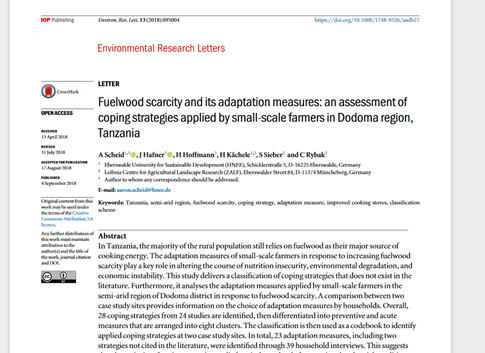
copyright: IOP Science
Fuelwood Scarcity and its Adaptation Measures
An assessment of coping strategies applied by small-scale farmers in Dodoma region, Tanzania
- Publication
- Citation
A Scheid et al 2018 Environ. Res. Lett. 13 095004
In Tanzania, the majority of the rural population still relies on fuelwood as their major source of cooking energy. The adaptation measures of small-scale farmers in response to increasing fuelwood scarcity play a key role in altering the course of nutrition insecurity, environmental degradation, and economic instability. This study delivers a classification of coping strategies that does not exist in the literature. Furthermore, it analyses the adaptation measures applied by small-scale farmers in the semi-arid region of Dodoma district in response to fuelwood scarcity. A comparison between two case study sites provides information on the choice of adaptation measures by households. Overall, 28 coping strategies from 24 studies are identified, then differentiated into preventive and acute measures that are arranged into eight clusters.
The classification is then used as a codebook to identify applied coping strategies at two case study sites. In total, 23 adaptation measures, including two strategies not cited in the literature, were identified through 39 household interviews. This suggests that the majority of coping strategies applied are independently from regional and social conditions. The majority of the strategies applied at the case study sites and described in the literature are acute measures that do not tackle the underlying problem triggering forest degradation. It is observed that the adaptation measures across the case study sites are widely congruent, thus showing that acute strategies are not replaced by preventive strategies but rather co-exist.



